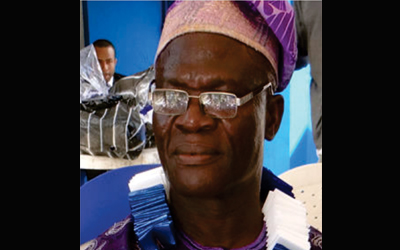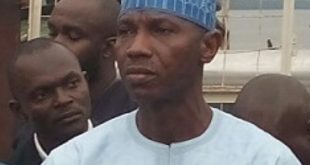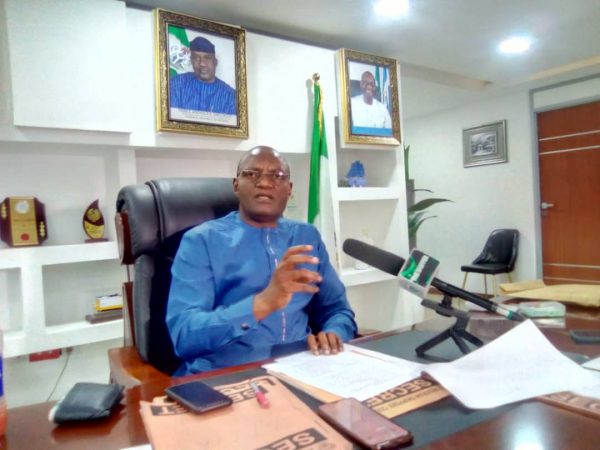
Exactly June 25th 2021, Hon. Emmanuel Jime was appointed the Executive Secretary and Chief Executive Officer(CEO), Nigerian Shippers’ Council(NSC) by the then President, Muhammadu Buhari on the recommendation of the Minister of Transportation, Hon. Rotimi Amaechi. Jime is a man destined to work in the maritime industry.
Before Dr. Dakuku Peterside was appointed the Director-General of the Nigerian Maritime Administration and Safety Agency(NIMASA) in 2016, Jime’s name had featured as the DG of NIMASA in the media. But the politics of appointments in the presidency took him out. Perhaps, Amaechi needed people he thought he could work better with then. Jime’s luck kept hovering around the maritime industry despite having held appointment as the managing director of Nigeria Export Processing Zones Authority(NEPZA).

The exit of Barr. Hassan Bello at the NSC provided opportunity for him to be tested in the maritime sector. He has a towering pedigree preceding his entry into the maritime industry. Could this be the catch for Buhari and Amaechi? He is a former Speaker, Benue State House of Assembly and two times House of Representatives member and Benue State gubernatorial candidate under the ruling All Progressives Congress(APC) in 2015 elections. There is certainly something about Jime that singled him out for this job!
Amaechi had said he preferred Jime for the NSC job among many others in contention at a reception in Jime’s honour at the Eko Hotels, Lagos in 2021 because of his gentility and humility as well as intelligence. But can these factors deliver performance in leadership? How has NSC fared under Jime’s watch in two years?

Port Economic Regulations
The NSC became the Port Economic Regulator out of necessity. It is an additional responsibility added to its pristine role of protecting the interests of shippers. The Council became a regulator under Hassan Bello who nurtured and gave the agency teeth and foot in that regard. He took the NSC to enviable heights where Jime took over for consolidation in a relay-race for a common mission. This was as expected.
As the Economic Policeman of the industry, how did the Council manage the monitoring and repatriation of funds by the multi-national shipping firms and their allied terminal operators? How were they able to set and manage the tariff structure in the logistics and shipping chain as well as the container deposit conundrum? How did they manage the standards for service delivery, facilitate ease of doing business and ensure compliance? How protected are shippers’ rights and the obligations on both divides? What are the states of the dry ports and the Vehicle Transit Areas(VTAs) spread across the country? How has the industry fared in automation and digitization? And what is the perception of stakeholders about the Council?
The function of NSC as the Port Economic Regulator is essentially the fixing and or approval as well as management of Costs arising from Cargo movement and setting the operating standards in the ports. The two defining elements here are Cargo and Cost, which determine the operations of any transport infrastructure, especially in shipping and ports.
Automation and digitization are the drivers in the emerging new port order and the CEO of NSC has said that compliance is almost 100 per cent with the exception of the government agencies that are badly backward. A senior customs officer had argued that agencies would not attain appreciable percentage in digitalization because of corruption in the system. For terminal operators and shipping companies, automation is the way to a seamless operation. Recently, a service portal for service delivery was launched by the Council.
Monitoring and Compliance of service providers has seen the Council locking up the offices and work environment of defaulters. Among them are terminal operators, bonded terminals and shipping firms.
Envisaging crisis in trade matters, the Council has established an Alternative Dispute Resolution mechanism while setting standards for service delivery, providing guidelines as well as putting tariff structures in place.
The siting of the Nigerian Port Process Manuel (NPPM) implementation in the Council, gave birth to the Port Standing Task Team(PSTT), leading to improvement in the ship turnaround time, cargo dwell time and easy access to the port. Though not entirely seamless yet.
The enforcement by the PSTT has also led to the dismantling of 70 percent checkpoints on the ports access roads.
The Complaint Unit of the Council established to help shippers get better services from service providers has recovered millions of dollars for shippers in the last two years.
It is on record that more states have shown interest in the development of dry port and truck transit parks within the period under review, Bornu State has commenced activities for Inland Container Depot, Adamawa State also has shown deep interest in establishing vehicle transit area. All these presuppose confidence in the leadership of the Council, which parades an array of most trained and knowledgeable civil servants amongst the maritime agencies of the government.
Dala dry port was commissioned early this year as Funtua inland port has assumed a new dimension of pace towards completion.
The only factor that could delay the maximization of the full benefits of these attempt at connecting the hinterlands with shipping services is the railway system. The success of dry port is dependent on rail linkage and functionality. However, not all the mapped out ICD locations are linked currently. This informed the synergy between the Nigerian Railway Corporation (NRC) and the Council.
The down sides
However, the agency needs to make more efforts in stakeholders’ engagement and improve on its corporate communications management. The public relations unit of the agency needs to be seriously rejigged to help the CEO move to the next level of port regulation and excellent public perception towards birthing a new port order. An x-ray of that department will soon be done in an independent report. A strong will is needed to move or redeploy a staff whose performance is below average in any department. The CEO had taken this move in the Audit unit, and the result is palpably transformative.
Jime, like Hassan Bello is drenched in patience in leadership and plays father-figure to all. So he gives a long rope to operate.
Jime:Two Years After, Stakeholders’ Verdict
By Babajide Okeowo
Having spent two years in the saddle as the Executive Secretary and Chief Executive Officer of the Nigerian Shippers’ Council, stakeholders in the maritime industry have hailed Hon. Emmanuel Jime’s performance.
The stakeholders ranging from shippers, freight forwarders, terminal operators and maritime lawyers in an exclusive chat with MMS Plus hailed the former lawmaker for his open-door policy, engagement with stakeholders and critical reformation carried out since he assumed office.

Dr. Emeka Akabogu, Maritime industry expert and Lawyer hailed Jime for the reforms brought about by the Port Standing Task Team (PSTT) and for hitting the ground running.
“I think he has done very, very well, given his relative lack of previous experience in the maritime industry.
He is a man who I know is very humble and who is always willing to learn. And that attitude has seen him very quickly learn the ropes within that short period.
In terms of what he has achieved, I think two years is a bit too small, too little to judge his performance.
So, I like to await the fullness of his tenure to be able to do more elaborately assess him. However, I would say that there has been some very, very significant milestones he has achieved. And the significant milestone is by virtue of the Port Standing Task Team (PSTT) which we all know is led by the Nigerian Shippers’ Council.
I’d like to attribute to him the tremendous success of the Port Standing Task Team, which is led by the Shippers Council in reducing corruption and in ensuring that Standard Operating Procedure (SOP) that have been set out for operations in the port are followed.
In addition to that, we also know that Cargo Tracking Note of recent has been approved. And these are significant things which are of a lot of value to the industry.
I sincerely believe that hopefully, within the rest of his tenure, he’ll be able to consolidate on the progress he has made as there’s still a lot more to be achieved” he said.
Continuing, Akabogu disclosed that there are still room for improvement.
“However, there are some areas that need a lot of attention, particularly with regard to standardizing the charges which we have within the terminals and the shipping companies.
Many of the freight forwarders still complain with regard to some of the issues around charges. But I do know that one of the things which happen regularly anyway is that the Shippers Council tries as much as possible to respond to individual cases which are brought by either importers or freight forwarders.
But that end of the relationship between those parties, importers or freight forwarders with shipping companies and terminal operators, there’s still a bit to be done there.
And I encourage him to focus, particularly with regard to ensuring that standards are enforced and that operators are held to account where they are found wanting.
But at the same time that the interests of the operators are protected within the context of the Shippers Council’s role as an economic regulator to ensure that there’s balance and fairness in that industry,” he said.
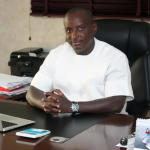
On his part, Alhaji Aminu Umar, President of the Nigerian Chamber of Shipping credited Jime for doing so well in the area of stakeholders’ engagement.
This, he said was responsible for how the ES was able to avert a huge crisis that would have grounded port activities in the country.
“I think Honorable Jime has performed very well especially when it comes to stakeholders’ engagement, he is almost everywhere discussing with stakeholders ensuring that whatever issues you have is resolved.
One critical issue comes to mind you could see him at the vanguard of championing the resolution of the strike action by the Maritime Workers Union of Nigeria (MWUN) when they threatened to go on strike which is very commendable, imagine if they had gone on strike how much the country would have lost in revenue at this very critical time in the history of the country.
He was able to champion it and see that it was resolved and the strike was called off.
There is also serious engagement between the shipping companies and the NSC to ensure that shippers are able to clear their goods and bring them out from the port” he disclosed.
Continuing, Umar disclosed that as the Port Economic Regulator, the NSC through the Standard Operating Procedures (SOP) that were put in place in the port is ensuring that things are working perfectly and that corruption is eradicated.
“For example, the Maritime Anti-Corruption Network has done so well to eradicate corrupt practices in the ports
This Maritime Anti-Corruption Network is non-profit organization that partners NSC under the Nigerian Ports Process Manual(NPPM).
‘Shipowners have seen the value of what they have done so much in the way our ships, which come into the port or going out of the port are being handled by different agencies.
“Things are done with quick dispatch, there is less interference and less corrupt practices. That has been the order of old operations before.
“I’m sure that is because it is because of his intervention. Honorable Jime has engaged all the stakeholders, especially the agencies operating in the port, to make sure that things are done smoothly” he enthused.
Speaking on what should be done differently and areas of improvement, he demanded that corruption needs to be completely eradicated in our ports.
“This is very important because if we want to compete with all the ports in the world, we need to make sure that our ports are smooth and that corruption is totally eradicated. And the fact that it is being hosted, and championed by the Shippers Council, I believe the Port Standing Task Team is doing well. Recently, I’ve seen even the person that is heading in Shippers Council receiving awards internationally and locally. So, it showed that they are doing very well. So, we need them to do more of that,” he added.

Otunba Frank Ogunojemite, the President of Africa Association of Professional Freight Forwarders and Logistics in Nigeria, APFFLON differs!
He disclosed that the ES needs to engage more with stakeholders and be more receptive.
He expressed worries that Jime is running the NSC as if he is not worried about failing.
“I cannot rate the ES of the Nigerian Shippers’ Council because I have not seen anything that he is doing positively from my own perspective.
“Why do I say this? So many times, we have tried to engage with him. To bring some of the issues in the industry to his attention, but, most of the time, these people are unreachable.
“If I have to rate him, I will have to compare him with Barrister Hassan Bello whom you can call at midnight and know what’s going on in the industry.
“For instance, on the Cargo Tracking Note, Webb Fontaine came not too long ago to talk about the implementation of the Cargo Tracking Note, this is a company that has not performed creditably on the previous contract with the Nigeria Customs Service and they are deviating into CTN.
“We are one of the people advocating for the Nigerian Shippers’ Council to take control cargo tracking. It is one thing to have a policy,
We Are Working Towards Bringing Shipping Closer To People -Jime
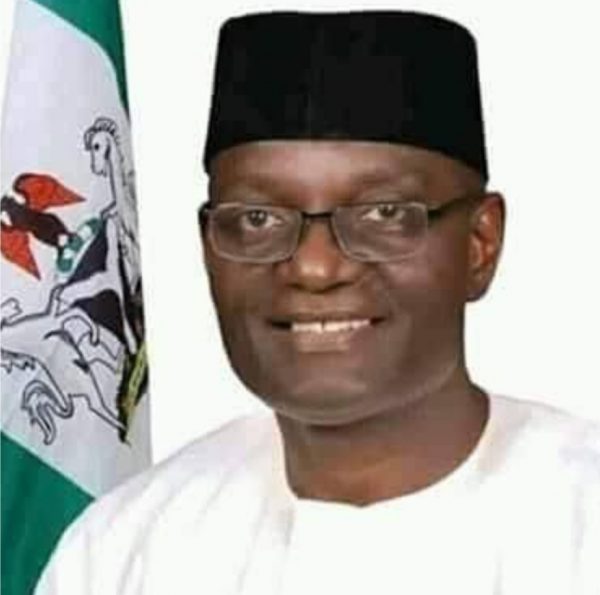
Hon Emmanuel Lyambee Jime is the current Executive Secretary/Chief Executive Officer of the Nigerian Shippers’ Council, he was appointed by President Muhammadu Buhari in 2021.
In this interview conducted before Buhari commissioned the Dala Dry Port in Kano, he explains the place of the Nigerian Fleet Implementation Committee saying, contrary to the popular belief, it is meant to “Create enabling environment for private sector to invest and participate in ship ownership.” He said the Committee has achieved a lot by creating a legal framework and incentives in the business.
Under his watch, the Council has recorded tremendous turnaround, in this interview with MMS PLUS’ Editor-In-Chief, Mr. Kingsley Anaroke, he delved into several issues affecting the maritime industry, proffering solutions and the way forward. Excerpts.
Let’s take a brief appraisal of what you think the industry is since you came in, what do you think the industry is? What is it like? What is the experience like since you came in as the Executive Secretary of the Nigerian Shippers’ Council?
Well, thank you so much for giving me this opportunity to once again look at our maritime space and indeed to say to you that my experience in the one year and a couple of months that I’ve been here indicates what I’ve always thought, that perhaps the maritime industry is the most strategic industry of any nation.
When you recall the statistics that say over 90% of international trade is done through shipping, that will give you a bird’s eye view of the very strategic position of the maritime industry.
And so, for me, this is an industry that needs to be given the utmost attention. Sometimes I chuckle when people create the impression that perhaps the petroleum industry is indeed the mainstay of Nigeria’s economy.
And then my immediate response to that is that if there hadn’t been an ability to transport crude to those destinations where they’re needed for refinement and also to have the ability to then transport those refined produce back into the country, then we will not actually really understand how strategic the maritime space is until you put that into some sort of context.
So, my argument, therefore, has always been that without transportation, there really cannot be trade.
And so that, for me, is the first thing that I think we need to underscore. So, for me, the maritime space obviously should occupy very top levels of our appreciation of what this means for any nation’s economy, and in particular Nigeria’s economy.
So, I would say that my experience so far has actually brought that very clearly to the fore. It then means that all of us, the agencies that are involved with the delivery of services in the maritime space, need to then understand the very important role that we all are required to play in order to ensure that this industry is contributing its quota to the gross domestic product of the nation, as it were. Let me just quickly remind us, though, that the Bureau of Statistics gives the impression that the total contribution of the maritime industry to the GDP is almost next to nothing.
I think we can argue that because, as I said earlier, there is no way are you able to do any form of trading without, of course, the role that the maritime industry plays. So that, for me, will be the foundation on which I would like to express my appreciation of the industry at this point in time.
Now, I spoke earlier and I would like to repeat that the agencies that are involved in the management of the space, therefore we need to understand how really important the roles are, which then brings me to the Nigerian Shippers’ Council and the role that the Council has been mandated to play.
Now the Shippers’ Council’s role from the original conception of the agency was actually meant to be the protector of shippers, and the interest of shippers, after the reforms in the industry, with the concessioning of the port and the invitation, as it were, of the private sector, to begin to play very active roles, especially in the management of our port terminals and other operational activities in the space.
It became important and necessary that there should be an independent body that will be given the mandate to regulate this space. And the lot falls on the Nigerian Shipper’s Council. The reason being that the role that the Shippers Council played of protecting the interests of shippers had already predisposed it to perform also the role of being an independent economic regulator.
So, at the moment there has been an evolutionary trend which has now put the Nigeria Shippers Council front and center as an unbiased regulator that has the mandate to protect both the providers of services and also the consumers of services as well.
What that means is that we now have a greater mandate to ensure that there is efficiency and quality of services in our port’s domain, but also to make sure that these services are delivered in a manner that is cost-effective.
So, as we play the role of protecting consumers and providers of services, we are also required most importantly to be a moderator. In other words, we moderate costs and that’s the reason why the Nigerian Shippers’ Council has over time has had to develop the kind of tools that will allow us to be able to exercise that mandate in a way that can become very effective in the way that we’re regulating the space.
Today, because of our activities, I can say proudly that the Nigerian Shippers’ Council has been able to institute a regime of transparency in our port space. So, for instance, we have been able to provide an indicative freight rate.
As an example, we have been setting standards for service delivery and also, we are also involved in the provision of guidelines for the setting of tariffs. For example, not too long ago we also embarked on the implementation of the harmonization of tariff nomenclature of port-service providers.
What that helped us to do was that we were then able to reduce these nomenclatures from over 30 to about less than five. Now, the impact that does have on the cost of doing business can only best be imagined.
Of course, the Shippers Council is involved in the monitoring and enforcement of compliance, okay with approved standard and the tariff structure that were put in place.
I want to also report that we have been able today to standardize haulage rates around the country because of the role that we play in regulating this space.
The Shipper’s Council is also deeply involved today in the institution of an Alternative Dispute Resolution mechanism.
And the way we go about it is to create within my office a unit that is responsible for addressing complaints called the Complaints unit. And this is a very robust unit that, as I said, is under my direct supervision. When you operate in a commercial environment, it goes without saying that there will be disputes. Now, for a businessman, every time, wasted can be approximated to cost.
And so, what we try to do is to engage in dispute resolution mechanisms in a way that allows us to be able to do it within record time. So today, for most disputes that are reported to the Council, we were able to address them within a period of seven days maximum.
Now, if we’re going to go through a court processing order to adjudicate on matters, you can imagine when the case goes to the Federal High Court, from the Federal High Court to the Court of Appeal, and then ultimately to the Supreme Court, you can just best imagine the length of time that it would take for that to happen.
So, I’m just saying that our intervention by way of this Alternative Dispute Resolution mechanism that we have in place that’s really assisted in the way that we’re resolving matters.
Now, finally, and most importantly, the government in its wisdom decided to introduce a document called the Nigerian Port Process Manual. Now, the Port Process Manual I like to describe like a Bible, which has been put in place in order to guide the activities of all operators in our maritime space.
The Nigerian Shippers’ Council is the lead agency that has been given the responsibility of monitoring the implementation of the Port Process Manual. In order to be able to do that, we also set up a Port Standing Task Team, again under the leadership of the Nigerian Shippers’ Council.
That effort, that activity today has led to an improvement in turnaround time. It has led to an improvement in cargo dwell time. It has led to an improvement in our ability to be able to access the ports more easily than was done in the past.
In other words, we have today what is called operation free the Port Access Roads. These and other activities of the Nigerian Port Process Manual under the leadership of the Nigerian Ship of Council have led to a massive improvement in the manner in which businesses are conducted in the Nigerian port. So, these are areas of engagement that the Nigerian Shippers’ Council has been fully involved with at this point in time. And I’m happy to say that the industry is definitely the better for the industry,
That’s very good. Let me ask again, talking about the role of regulatory function, how compliant are the port service providers now?
That’s a very important question. I almost would have forgotten it. Fact of the matter is that when the Nigerian Shippers’ Council started implementing and exercising the mandate, there was an initial resistance.
We didn’t have sufficient enough buy industry. The reason in my understanding was that people seemed to misunderstand the mandate. And so much of the resistance that came was actually, in my opinion, attributable to people not understanding that there was a need to have an independent body in the environment that became necessary as a result of the reforms in the industry.
As I said earlier, when the government embarked on Ports reforms, there was no immediate regulator in the environment. And so, it allowed the operators to pretty much run the show without anybody monitoring or indeed intervening to make sure that everybody was properly guided to do the right thing.
And so that was the environment in which the Nigerian Shippers’ Council was born and given the responsibility of being a port economic regulator. Because of that misunderstanding, a couple of the operators, stakeholders, port terminal operators, and shipping companies actually in some cases even instituted court actions, some of which unfortunately have lingered for quite a while.
The good news is that in the last two years, particularly in the time when I’ve had the honor and the privilege of oversighting this agency, we have now managed to get to a point where there is buy-in by the industry. So, to answer your question, the fact is that right now the compliance level has gone a notch higher than it used to be in the past.
Most of the individuals and most of the companies and the bodies that took us to court have now decided on their own volition to approach the Nigerian Shippers’ Council, and we are in the process of actually settling most of these litigations out of court. And like I said, is the understanding now that the Council’s role is actually to the benefit of all the stakeholders because you need to have regulation for there to be businesses that will runes efficiently and as effectively as they should run.
All right, so long and short at the moment, we don’t have any resistance for that to the role of the Council. That of course has given us the ability to then be able to institute this regime of transparency in our port that has obviously, definitely brought some additional benefits in the way that maritime space has been governed.
Okay, here again, in your estimation, how would you rate the ease of doing business in Nigerian ports?
Like I said, there is an improvement. We’ve moved quite some notch from where we used to be. Keep in mind I mentioned the activities of the Port Process Manual and the Port Standing Task Team and indeed how it has impacted on, for instance, cargo dwell time, on how it has impacted on turnaround time in the port, the joint vessel boarding activity that is monitored by the Port Standing Task Team, the joint clearance activities monitored by the Port Standing Task Team.
These and many others are actually reducing the cog-in-the-wheels that we have in the way of seamlessness of doing business in our ports. So, there is improvement. Are we where we should be? No, and part of the reason why we are not where we should be, that first; the Nigerian Shippers Council has been in the forefront of advocating for automation and of course and digitalization as well.
Whereas most of the stakeholders, whether it is shipping companies, whether it is port terminal operators, I can say quite a number of them have imbibed this culture of automation. There are some that I can report over almost 100% of compliance. But when it comes to particularly government agencies, we are not there yet where we should be. So, there’s still some work to be done. I think that sooner or later when for instance, the Nigeria Customs Service deploys these scanners that we’ve been talking about for as long as I can remember and that process is ongoing right now.
The deployment of scanners in our port is going to aid dramatically in the manner in which we’re able to clear goods out of our ports. That is part of the challenge that we have.
The other challenge that the PSTT is having is the removal of illegal checkpoints. As of today, I can say confidently that over 70 of those illegal checkpoints have been removed by the PSTT. So, these are, unfortunately, the challenges that we’ve had.
The advocacy has been strong on automation. Let me repeat. And of course, as I said earlier, once you digitalize and you reduce the extent of human interface, then automatically the incidences of corruption will be addressed in very, very dramatic fashion.
And so, I’m glad that were moving rapidly in that direction. Let me further add to say that the development on our maritime space which is the introduction or better still, the commissioning recently by Mr. President of the Lekki Deep-Sea Port, that will bring a freshness into my time-space in a way that has never been experienced before.
Outside of the fact that Lekki Deep-Sea Port is going to be 100% automated, 100% digitalized, and then the fact that the ability of Lekki Deep-Sea Port to enable Nigeria to be a transshipment hub.
These are advancements in my opinion as to the business climate, as far as maritime space is concerned. So little steps were taken, I must say.
But we’re actually moving in the right direction and we’ll have to continue being focused on those very, very important areas that will grant further efficiency. Let me finally say this. We have made the advocacy for an intermodal way of cargo evacuation.
The reason for this, let’s be clear in our minds if we do not have the rails working, if we don’t have waterways working, continuing to use the road network as the sole singular means of cargo evacuation cannot do good service to such a beautiful facility as the Lekki Deep Seaport.
For example, so, if you’re looking to decongest, if you’re looking to move businesses faster, it’s clear to me that the development of these other models of transportation, in other words, rail system, the deployment of barges, these are aspects that need to come together. They’re all like pieces of the jigsaw that need to come together in order for us to have more efficient delivery of services in our ports. So yes, there’s still some work to go, there’s some ways to go, but we’re definitely headed in the right direction.
And my humble estimation of the industry that in the days ahead, the shipping community and indeed the ability of the Nigerian ports to deliver quality services will best be enhanced.
Let’s not also forget that we’ve always made this objective one of our greatest desires, that Nigeria should actually constitute a maritime hub, at least in our West African region, and Lekki Deep Seaport, in my opinion, is the beginning alone of one of those magical developments that would take us on that pathway of enacting, our ability to be a maritime hub, at least in the West Africa sub-region.
Okay, to me, what I consider the myth around the Lekki Deep Sea Port, the myth built around it is that of the crashing the cost of doing business. The way I look at it, aside from being automated and digitalized in the processes, we’ve not talked about cargo evacuation; the rail and barges variables were not factored in. And if you look at the cost of transporting these cargoes by land from the Ogun State and back to Lagos, it is still going to be expensive, so, I keep wondering if it is really going to cut the cost of doing business in the long run and on the short run. What is your take on tnis?
I think it’s fair to say that it has to be in the long run. Okay, because I will be the first to admit that there are challenges and I think I’ve spoken to those challenges. But the good thing is that there is a recognition that we have those challenging circumstances and there’s effort already that is being geared towards dealing with those circumstances. So long and short, I think my quick answer to that would be that in the short term, obviously we’re going to experience some difficulty. The transshipment aspect though is that you have to remember that until recently, most of the cargo that was destined for Nigerian ports was actually transshipped in places like Lome even far off as Tema in Ghana.
The implication of that in terms of cost cannot actually equate to transporting or transshipment from Lekki through barges. Clearly, if we begin to talk about the economies of scale, that gives, I think an idea of what we’re actually addressing here. I go back to the point I made earlier, that it’s not something that will just wake up overnight. But definitely as these pieces begin to come together, I’m aware that as we speak right now, there’s already an agreement that will lead to the construction of a rail line out of Lekki that will connect the line leading to Ibadan and then, of course, upwards to the movements into the hinterland.
So that will create its own advantage. At the moment, of course, there’s already a structure that has been put in place for the structuring of ocean-going barges that will also be used to evacuate cargo out of Lekki. I think those who have delivered Lekki were mindful of these circumstances. And of course, already, you know, some attempt have already been put in structuring, something that can alleviate some of the problems in the short term.
Okay, the global shipping space suffered some sort of spike in the last quarter of last year when Global shipping costs rose by over 600% as at last quarter 2022. That led to so much inflationary cost in food prices and energy. Also, the COVID 19 pandemic led to the issue of container crisis, how does the Nigerian Shippers’ Council fit into all these?
Cost moderation actually does have a lot of factors that we need to consider. The first obviously for me is the operational efficiency in the port. I believe that once you are able to step up and get to the levels that there is efficiency in service delivery. So, for instance, in the past, it took a vessel more than seven days to even berth, much less get cargo discharge, because of the activities of the PSTT, today it ‘staking slightly under 24 hours for that to happen. Now certainly you have to compute that into cost and you know, the Math shows to me that if a ship were to anchor in our waters for 24 hours every day, the cost is almost up to $20,000 per day. Right. So, by some little mathematical projections, if a ship is going to be in our waters for seven days, you have to multiply that by $20, 000 per day.
So, operational efficiency is necessary for cost to come down. And I think we’re beginning to achieve that because the activities of the PSTT have clearly led to a point where there is great improvement on those timelines. Whether it is cargo dwell time, whether it is turnaround time, whether it’s the length of time that is taken for vessels to come in and go.
So that, in my opinion, actually impacts on cost. Now, if you leave operations, you have to also go to some of the more physical dynamics. What is the quality of facility and infrastructure that’s available. Now if, for instance, it’s going to take, as we’ve been saying, more than 24 hours, in some cases close to seven days for cargo to be evacuated from, let’s say, Lagos to Kano because it has to go by road and all that.
Now, clearly the differential, if you were to move that by rail and you were to take a day or two or three, again, that also impacts on cost. Of course, there is a limit, I believe, from the economic perspective, how far you can go with trying to moderate on cost. As you do that, you also must take into account the peculiar circumstances in which you’re operating. And therefore, that’s the reason why we have Regulatory Services Department that has the expertise to sit down in negotiations that these variables are put on the table for us then to be able to come to an agreement to what is it that can go as, especially in terms of local charges.
So that, I think, for me, will be the reply. I like to give all kinds of variables that are available, but definitely we are also experiencing a reduction in the sense that these other activities of ours that have led to greater efficiency in the delivery of services are also ultimately impacting on the part of doing business as well.
Okay, sir, I had the privilege to be in Abuja recently when the Nigerian Fleet Regulation Committee report was submitted. You were not there, but then they submitted the reports with far-reaching claims of success and all that. Document-wise, a lot of things were achieved, but surprisingly, some have not been put into practice. So there seems to be a gap between reality and then success on paper. Why is this so?
So, I’m glad. First, we have to note that there were successes because we’ve been able to identify those requirements that need to be in place. Let’s understand this. A lot of people, I think, misunderstand fleet implementation to mean the Nigerian carrier.
They’re not the same. I mean, fleet implementation by conception is actually just to be able to create an environment that can then attract the private sector to invest and then participate in ship ownership.
This is really but of course, the requirement there is that those ships will fly the Nigerian flag. That’s really what flight implementation was about in the first place. Now we’ve done something.
We’ve created what I’ll call the legal framework. We’ve also put down, most importantly, the incentives that are needed. So, for instance, those tax exemptions that we require. And then of course, the idea of giving the Nigerian ship priority of cargo, for example, we’re saying that the Nigerian ship in the area of crude, for example, should be giving priority over and above another ship. These are a couple of those incentives, some of which at the top of my head I’m not able to remember.
So yes, we put those down on paper and they are beautiful. But as you say, the gap comes from the implementation side. Reason being most of those incentives are not warehoused in a particular ministry.
There are different agencies of government. The Ministry of Transportation, that is our parent body, put together this exercise. But we have come up with incentives, some of which are in the domain of some other agencies. So, for instance, the NNPCL, so then, so the Federal Ministry of Finance. These are bodies that are required to come together. The NIPC.I think what I can say for you in response to this particular challenge that we’re having is the ability to bring in a harmonized structure that would then take the recommendations that were made and have it implemented wholesomely.
That really is where the challenge is. We have done what we needed to do as the Fleet Implementation Committee. We have handed over our report to the Ministry. I believe that in the wisdom of the Honorable Minister of Transportation, he’s taking his time to look over the reporting that we’ve made and the necessary mechanism that will be put in place so that those important incentives are granted.
Only then can we actually begin to talk of a takeoff of the Nigerian Fleet. But first, you have to put the structure in place, which we’ve done. If we didn’t put the structure, then that would have been a completely different discussion altogether, would be having the structure in place. Now what’s left is bringing the will, the political will of the government, and making sure that all of those bodies that are responsible for granting all those incentives are brought together under the same roof. And then, of course, the implementation, I believe, can commence.
Does it worry you that one year after AfCFTA took off, in Nigeria, we are still discussing on the table and how it’s going to fly? We just finished a conference; we don’t seem to have woken up to begin to take advantage of that and we don’t just have an idea. So how do you look at that and then lets have brief appraisal of what has happened, what do you think we achieved?
What just took place, I think AfCFTA first of all, for me, really is a blessing. Let’s really stay focused on the benefits. The fact that Nigerian businessmen will now suddenly have an opportunity of a market that is over $1.3billion, is something that is massive. So, for me, really, we need to be able to take advantage of this development because the multiplier effect of what that can do in an economy is something you can only dream dreams and believe that we are on course.
So, I am happy that this development has come in our time and that we are participating in it. What’s left, obviously, is to put in the hard work that needs to be done because remember, Africa, is made up of different jurisdictions in terms of whether it is the economic policies, the Customs and Excise regimes, and to be able to bring all of this under one system and get a buy-in of everyone, that wasn’t ever going to be an easy exercise. But believe me, I’m truly, truly excited that we’re now moving in a direction where the protocol put in place by AfCFTA is beginning to bear fruits, and indeed, most of the countries that are participating in about 55 African countries are beginning to show serious interest in the implementation of the agreement.
The truth is that we need to remove these tariff and non-tariff barriers. So, for instance, today, you know very well that to be able to move from Apapa here to Seme and then cross into Benin, how many checkpoints, for example, are you going to see? What is the nature of the road? What’s the infrastructure?
I mean, there is serious infrastructure deficit in Africa, that will be a serious challenge. We need to recognize all of that. We have to have rail connectivity. We have to have connections through our waterways.
That is what those protocols in theory have already addressed. What then is left is the practicability, it’s not going to happen in one fell swoop. But my comfort that I draw and the reason why I’m very excited about this is that there is now an awakening, there is a recognition.
Kingsley, there’s something that I like to describe anytime as an analogy of the challenge that we’ve had before AfCFTA.
Do you know that before now for a cargo to move from, let’s say, Tincan to Tema in Ghana, that you actually be surprised that that cargo will have to first dock in a European country because of the hub system, we’re using ships that are not owned by Africans.
So, cargo that is destined for Ghana from Nigeria, has to go to Portugal, has to go to Italy before it reroutes. That’s traumatizing, right? That’s traumatizing. So, we are now coming to this point that we are able to overcome this sort of challenge. This is a joy to behold.
I personally would be happier dwelling on the positives that will come out of the implementation of AfCFTA. The challenges, of course, are there for us to overcome. And I believe that African nations are actually working as one voice, particularly in this particular matter, and we definitely believe be able to overcome it.
Are you aware that there is a challenge for dry port operators, Kaduna and lately, Kano in terms of Customs bureaucracy to clear goods, it makes it challenging and more expensive thereby reducing the essence of the dry ports in a way?
Okay, so first let’s understand this. Kaduna Inland Dry Port is a port of origin and a port of destination. Now, Dala Inland Dry Port is a port of origin and a port of destination.
As a matter of fact, the president is just about to commission Dala Dry Port on Monday coming. So just to update and to understand where we are at. Funtua is close to 95% being completed.
And on Thursday, the Minister of Transportation is going to Dala to declare it a port of origin and a port of destination. So, for a start, those dry ports are already beginning to achieve those designations.
Now, of course, the implication, obviously speaking to the question, is that the ports will then begin to function as a seaport. All of the attributes of a seaport will definitely be available in the dry port as well, which, by the way, was actually how this whole thing was conceived originally.
So, this is a development that we are very happy and I’m glad that in my time we’re able to move the needle a lot much so that these ports are now beginning to be put in the place where activities can effectively be carried on.
Now, as to the challenge now, the first thing obviously is rail connection. And I see where you’re coming from with that. Obviously, if we’re going to continue with this present method of evacuating and moving cargo through the road networks, that is going to present a monumental challenge.
But Dala, for example, has been connected to the rail. It was one of the conditions, one of the key conditions for the declaration of Dala as port of origin and port of destination, Funtua has been connected to the rail.
The Dry Port in Plateau, that has been taken over by the state government and the process is moving faster than when it was under a private consortium.
So, these are developments that we’re, shall I say, very comfortable with. Ibadan Dry Port is also moving now at a pace that we can report is a tremendous amount of progress.
Now also I’ve woken up to a number of states that have begun to show a lot of interest. And for me, when a state shows an interest in the development of a dry port, that usually is very heartwarming.
The reason being that ownership of the land in the state belongs to the state. And for business people, if you grant a businessman the incentive of giving him land free of charge, there can be a better incentive than that. And the only organization, the only body that has the ability to afford such an incentive is the state government.
All of the dry ports that have already, like in the case of Dala Dry Port, kudos to the state government, they did a yeoman’s job in participating in providing infrastructure. Every single thing that you see, if you go to Kano Dry Port today, you’ll be very massively impressed by the development that’s taking place there.
The same thing, of course, is going on with Funtua. And of course, as I said earlier, unfortunately, some of the other dry ports, especially in the southeastern parts, haven’t taken off in the way and manner that we’re hoping they would.
But the good news also even in that context is that we’re now beginning to have an interest. For instance, the Abia State government has begun to show interest sufficiently, enough interest in the development of the Dry Port located over there in Abia state.
Very soon I’ll be discussing with the governor of Ondo state who has shown sufficient enough attention to the development of a dry port in Ondo State as well.
So, there’s a lot of activity in summary coming up as far as the development of dry ports is concerned. And honestly, it gives me a lot of joy because what was the original conception? It was first to make sure that shipping was brought closer to the shipping community all over the nooks and crannies of this nation and also to be able to assist us in the decongestion of the seaport as well. So, connectivity in general is what is required.
And don’t forget that also plays into the larger picture of AfCFTA because without connectivity, there’s really no way that after it’s going to have the sort of impact that we’re hoping it would.
What is the state of things with Atlantique Marine and Engineering Services (AMES) Edo Inland Dry Port? Does it mean with the man’s death, even the state government couldn’t do anything?
I don’t want to speak about it from the top of my head because there’s more current information that I really do not have at my fingertips right now, except to see that there is now an interest to further that particular and advance the progress of this.
On Cargo Tracking Note, what is happening?
Well, at the moment we are waiting for the Federal Minister of Transportation, where the whole process now has been domiciled and anchored. The last information I got is that the procurement processes have gone to a stage where we should be soon enough taking proposals to the Federal Executive Council. That is the information available to me,
But I haven’t absolutely confirmed exactly that situation yet. But definitely, some tremendous progress has been made with the Cargo Tracking Note. Of course, I don’t know what I should say. People are still basically trying to stall the process, and court actions that have been instituted, but the lawyers are doing what they have to do.
We are making sure that as much as possible, the prosecution of those matters is also going at pace. But in the interim, there’s really nothing that is constraining the ability to make some progress. As far as Cargo Tracking Note is concerned, I believe that we will deliver it.
Is the NTC a foregone conclusion?
No, I didn’t say it was a foregone conclusion. The point I made with the NTC is that people have to remember that three times that the law was passed by the National Assembly. And for some reasons, the presidential assent did not come. This very last effort is the one that to me has left everybody really asking questions as to what exactly is going on and where are we at?
Because to the best of my recollection, the bill was passed third time by both houses and sent to Mr. President for his ascent during the period allowed by law for assent to be given. That assent obviously did not come. But I also am not aware that the bill was sent back to the National Assembly. So that becomes a bit of a challenge. And maybe I speak from my experience as a former lawmaker to say that unless and until the law goes back to the National Assembly, then we really can’t even be talking about resurrecting the process and getting it moving. So that is the particular challenge we’ve had.
But here is what I am also thinking. I believe that whilst we wait for the NTC it is important to take a second look at the Nigerian Shippers Council Act. And to perhaps, maybe begin to move quickly to see about it is moved quickly to “amend” it for a lack of better word, because I argued that whereas we have a lot of powers that we are operating, some of these powers are constituted in presidential orders, some of course, regulations which are made portion to the Nigerian Shippers Act.
It doesn’t give me the degree of comfort that I would have wanted. I would rather those presidential orders, for example, now be encapsulated into an act of Parliament in a way that gives it the kind of teeth that will survive and sustain the functions for the longest time possible.
So, in my little assessment of the situation, I believe that that is the work that is before me, I believe that I consider it as a legacy issue that we should make certain that the demand that the Nigerian Shippers Council is exercising right now. Even though it can be argued that presidential orders are actually law because they are made portion, of course, through the existence of substantive legislations and all that. But in order not to allow room for anybody to think and this I see in the light of the fact that so far, the activities and the exercise of that mandate really is beginning to install a degree of sanity in the way and manner that the port system is operating.
It is important to make sure that this is sustained over the long call. And so, I’m determined to work with my parent ministry. I’ve already put forward my proposals and hopefully we’ll soon be approaching the National Assembly to also take another look at that and then hopefully we’ll be able to begin the process of building a formal legal framework that actually allows the Shippers Council to be able to really exercise its mandate without having to look over its shoulders. That’s what I’ve been doing.
I have two things that are very important; the container deposit and insurance claim, what’s your take on these two key issues?
Container deposit again, is something that has been here for a while because everybody recognizes that it is a challenge in the industry that it needs to be addressed. Already some proposals have been made, a number of propositions has been brought to the management council, as at the last count, I think about three proposals have been made whether it is container guarantee or container insurance and there is a third proposal that is actually a mixture of both guarantee and insurance.
What the Minister has actually directed that we should do is to bring forward all those proposals that have been made and then a case will be made for which is the most preferable.
There is actually a need to address the Container Insurance regime in a way that can do justice to the industry effectively.
In summary, the process in ongoing, a lot of work is being done and the Minister has decided that this is one of the low-hanging fruits that he is going to achieve before the expiration of his tenure..
 MMS PLUS NG – Maritime, Aviation, Business, Oil and Gas News Online Newspaper with coverage in Maritime, Oil and Gas, Aviation, Power and Energy as well as Financial News
MMS PLUS NG – Maritime, Aviation, Business, Oil and Gas News Online Newspaper with coverage in Maritime, Oil and Gas, Aviation, Power and Energy as well as Financial News





